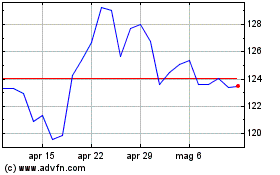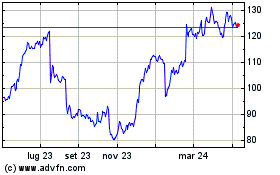Credit Delinquencies Improve For Card Issuers In February
15 Marzo 2011 - 8:49PM
Dow Jones News
Credit-card borrowers were more timely in their payments in
February, and their lenders charged off fewer of their loans,
monthly reports from large card lenders disclosed Tuesday.
There were indications, though, that lenders continued to have
trouble expanding their books of credit-card loans.
February data generally showed fewer delinquencies at U.S.
credit-card issuers including Capital One Financial Corp. (COF),
American Express Co. (AXP), Discover Financial Services (DFS), Bank
of America Corp. (BAC) and J.P. Morgan Chase & Co. (JPM).
With the exception of Capital One, shares of lenders fell
Tuesday amid broader declines in U.S. stocks, joining a global
market selloff that started in Tokyo as Japan's nuclear crisis
deepens and worries escalate over the human and economic toll of
last week's earthquake. Capital One shares rose 3.2% to $51.05 in
recent trading.
The more that cardholders charge on their plastic, the more the
companies earn in fees, so the amount that customers spend is
critical to them. Card-loan balances--and, as a result,
revenue--have been falling as companies, stung by steep losses
during the economic slump, scaled back on credit and toughened
lending standards. Revolving credit lines--mainly card
balances--shrank by $4.2 billion in January from December,
according to the Federal Reserve. That is an annualized rate of
decline of 6.4%. Since the end of 2008, these balances have shrunk
by $162 billion to $795.5 billion.
Credit-card issuing banks are also facing an erosion in profits
and revenue stemming from new rules curbing income on credit and
debit cards.
At Capital One, U.S. card loans at least a month behind payments
fell to 3.83% in February from 4% in January. Charge-offs in its
U.S. credit-card business dropped to an annualized 5.91% last month
from 6.79% in January, according to a regulatory filing on Tuesday
with the Securities and Exchange Commission.
Charge-offs are loans that a card issuer deems uncollectible
because borrowers can't repay them; they are based on past
delinquent balances. Delinquencies are loans that may be written
off in the future. The delinquency rate is important because higher
delinquencies force issuers to squirrel away capital to cover
potential losses.
At American Express, which has an affluent cardholder base, the
30-day delinquency rate fell to 2% in February from 2.1% in
January. In an SEC filing Tuesday, the company said it wrote off an
annualized 3.8% of its U.S. card loans in February, unchanged from
January.
Discover said charge-offs in February totaled 5.79% of
credit-card loans that have been packaged into bonds, modestly up
from 5.75% in January. The 30-day delinquency rate fell to 3.7%
last month from 3.84% in January. Discover and its bigger rival,
American Express, also process card transactions in addition to
issuing credit cards.
J.P. Morgan Chase said charge-offs fell in February to 6.21%
from 5.97% in January. In the same period, card loans with payments
at least a month past due fell to 3.29% from 3.39%.
Bank of America, at a write-off rate of 8.84% in February, had
the highest among its peers. But the rate was lower than the 9.20%
in January. Bank of America has consistently reported a higher
write-off rate than other major U.S. card issuers. Total
delinquencies were lower at 5.09% last month, compared with 5.17%
in January.
Citigroup Inc. (C) said it wrote off 7.95% of its card loans in
February, up from 7.49% in the prior month.
-By Aparajita Saha-Bubna, Dow Jones Newswires; 617-654-6729;
aparajita.saha-bubna@dowjones.com
(Matt Jarzemsky contributed to this report.)
Grafico Azioni Discover Financial Servi... (NYSE:DFS)
Storico
Da Giu 2024 a Lug 2024

Grafico Azioni Discover Financial Servi... (NYSE:DFS)
Storico
Da Lug 2023 a Lug 2024
